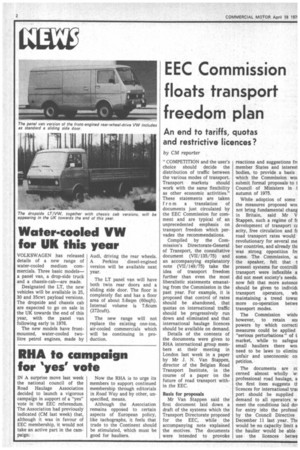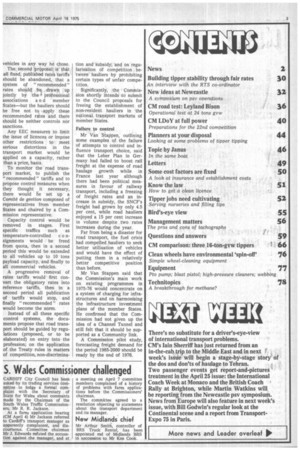EEC Commission
Page 4

Page 5

If you've noticed an error in this article please click here to report it so we can fix it.
floats transport freedom plan
An end to tariffs, quotas and restrictive licences?
by CM reporter "COMPETITION and the user's choice should decide the distribution of traffic between the various modes of transport. Transport markets should work with the same flexibility as other economic activities." These statements are taken from a translation of documents just circulated by the EEC Commission for comment and are typical of an unprecedented emphasis on transport freedom which pervades the recommendations.
Compiled by the Commission's Directorate-General of Transport, the consultative document (V11/135/75) and an accompanying explanatory note (VII/149/75) take the idea of transport freedom further than even the most liberalistic statements emanating from the Commission in the past year. For example, it is proposed that control of rates should be abandoned, that quotas on international traffic should be progressively run down and eliminated and that international haulage licences should be available on demand.
Details of the contents of the documents were given to RHA international group members at their meeting in London last week in a paper by Mr J. N. Van Stappen, director of the Belgian Road Transport Institute, in the course of a paper on the future of road transport within the EEC.
Basis for proposals Mr Van Stappen said the first document laid down a draft of the systems which the Transport Directorate proposed for the EEC, while the accompanying note explained the motives. The documents were intended to provoke reactions and suggestions fr( member States and interest bodies, to provide a basis which the Commission wot submit formal proposals to t Council of Ministers in t autumn of 1975.
While adoption of some the measures proposed woi. not bring fundamental chang in Britain, said Mr V Stappen, such a regime of ft development of transport ca acity, free circulation and ft road transport rates would revolutionary for several me ber countries, and already th( was strong opposition fix some. The Commission, the speaker, felt that t present systems for controlli transport were inflexible a did not meet society's needs. now felt that more autonot should be given to individt transport operators, wh maintaining a trend towat more co-operation betwe transport modes.
The Commission wishi however, to retain so] powers by which correcti measures could be applied "serious perturbations" of t market, while to safegua small hauliers there wot need to be laws to elimina unfair and uneconomic co petition.
The documents are cc cerned almost wholly w. professional road haulage, a the first item suggests tt licences for international trai port should be supplied demand to all operators w meet the conditions laid dol for entry into the professi by the Council Directive December 11 last year. Th( would be no capacity limit a • the haulier would be able use the licences betwe vehicles in any way he chose.
The second proposal is that all fixed, published rate's tariffs should be abandoned, that a system of " recommended " rates should be, drawn up jointly by the professional associations a n d member States—but the hauliers should be free not to apply these recommended rates and there should be neither controls nor sanctions.
Any EEC measures to limit the issue of licences or impose other restrictions to meet serious distortions in the transport market would be applied on a capacity, rather than a price, basis, To monitor the road transport market, to publish the " recommended " tariffs and to propose control measures when they thought it necessary, there would Le set up a Cornite de gestion composed of representatives from member States and chaired by a Commission representative.
Capacity control would be removed in stages. First specific traffics such as temperature-controlled c o nsignments would be freed from quota, then in a second period this would be extended to all vehicles up to 10 tons payload capacity, and finally to all commercial vehicles.
A progressive removal of rates tariffs would first convert the obligatory rates into reference tariffs, then in •a second period all publication of tariffs would stop, and finally " recommended " rates would become the norm.
Instead of all these specific control systems, the documents propose that road transport should be guided by regulations (proposed, or to be elaborated) on entry into the profession; on the application of the Treaty rules in matters of competition, non-discrimina tion and subsidy; and on regularisation of competition between hauliers by prohibiting certain types of unfair competition.
Significantly, the Commission shortly intends to submit to the Council proposals for freeing the establishment of non-resident hauliers in the national transport markets of member States.
Failure to control Mr Van Stappen, outlining some examples of the failure of attempts to control and influence transport choice, said that the Leber Plan in Germany had failed to boost rail freight at the expense of road haulage growth while in France last year although there had been political measures in favour of railway transport, including a freezing of freight rates and an increase in subsidy, the SNCF's freight had grown by only 4.5 per cent, while road hauliers enjoyed a 15 per cent increase in volume despite two rates increases during the year.
Far from being a disaster for road transport, the fuel crisis had compelled hauliers to seek better utilisation of vehicles and would have the effect of putting them in a relatively better competitive position than before.
Mr Van Stappen said that the Commission's main work on existing programmes in 1975-76 would concentrate on a system of charging for infrastructures and on harmonising the infrastructure investment plans of the member States. He confirmed that :the Commission had not given up the idea of a Channel Tunnel and still felt that it should be supported as a Community link.
A Commission pilot study, forecasting freight demand for the period 1985-2000 should be ready by the end of 1976.








































































































































